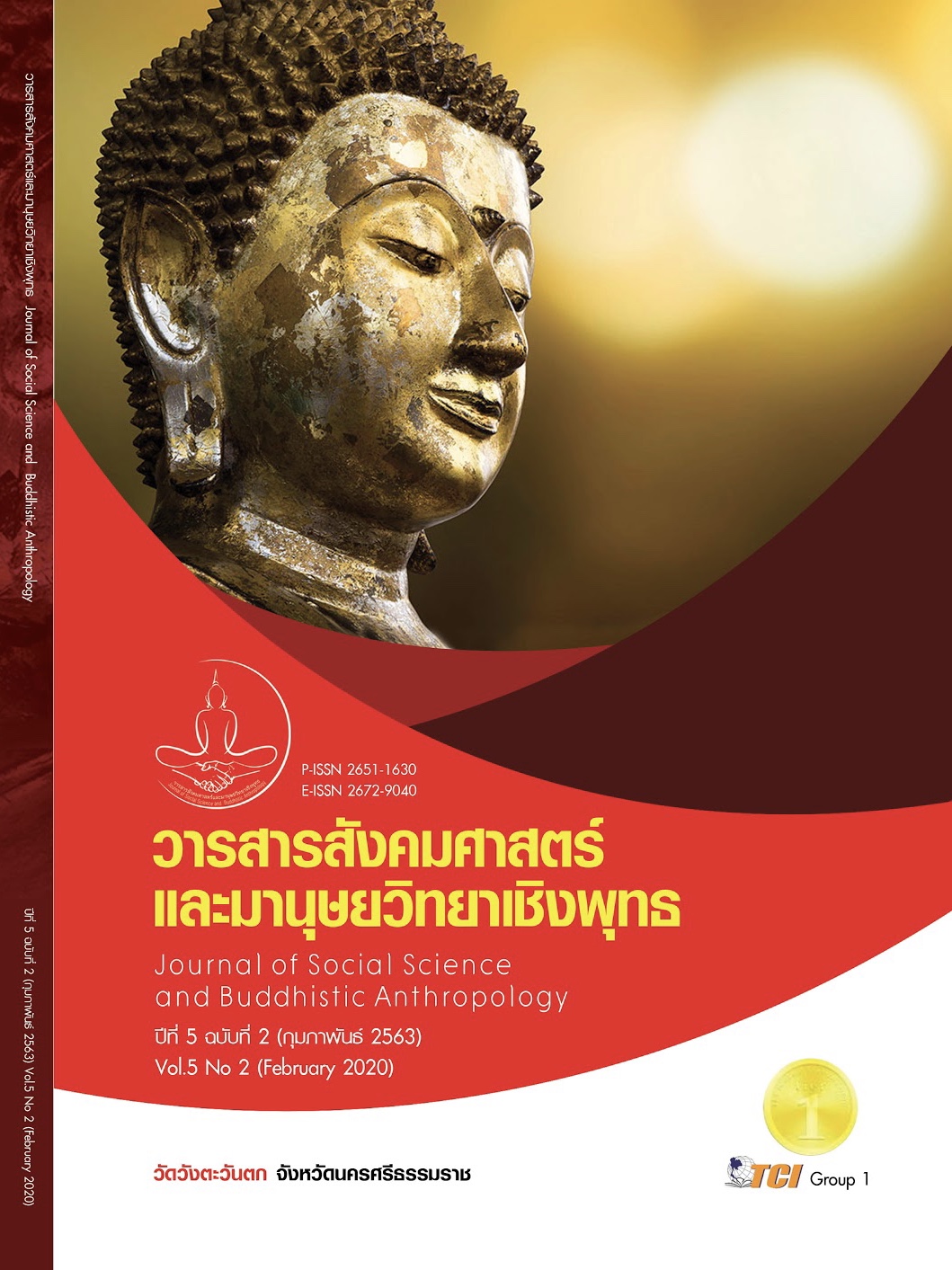EFFECTIVENESS MODEL DEVELOPMENT OF BUDDHIST METHOD ADMINISTRATION OF AGRICULTURAL COMMUNITY LEARNING CENTER
Keywords:
Buddhist Methods, Administration, Agricultural Community Learning CenterAbstract
Objectives of this article were 1) To study the factors affecting the administration of effective agricultural community learning center, 2) To develop effectiveness model of Buddhist administration of the agricultural community learning center and 3) To examine the validation of the developed model against empirical data using the multiphase mixed methods research. Divided research into 3: 1) Qualitative research by in-depth-interviewing and key informants 23 people. 2) Quantitative research by sampling with 520 samples. 3) Qualitative research with focus group discussions with 10 participants. The research instruments were interview forms, questionnaires and focus group discussions records. Qualitative data was analyzed using content analysis and inductive conclusion creation. Analyze quantitative data using descriptive statistics. Analyze correlations using software packages. Analyze to examine the validation of the model and analyze direct and indirect influence sizes with LISREL program.
Findings were as follows: 1) Effective agricultural community learning center must consist of success factors as the basic factors use participatory administration and proceeded by Dhamma for practice 2) The developed model consisted of two external latent variables, they were participatory administration and success factors and two internal latent variables: Dhamma for practice and effectiveness of Buddhist method administration. 3) The model was consistent with the empirical data with the qui-square value at 41.01, degree of freedom at 29, probability at .069, goodness of fit index was at .992, and root mean square error of approximation was at .028. Direct influences of participatory administration, success factors and Dhamma for practice resulted the effective Buddhist administration of the learning center with influence value at -.081, .658 and .399 with the statistical significance value at 0.01 respectively. And indirect influence influences of participatory administration, success factors and Dhamma for practice resulted the effective Buddhist administration of the learning center with influence value at .109 and .203 with the statistical significance value at 0.01.
References
กระทรวงเกษตรและสหกรณ์. (2559). แผนพัฒนาการเกษตร ในช่วงแผนพัฒนาเศรษฐกิจและสังคมแห่งชาติ ฉบับที่ 12 (พ.ศ. 2560 – 2564). กรุงเทพมหานคร: กระทรวงเกษตรและสหกรณ์.
เฉลิมศักดิ์ ศิริพันธุ์. (2555). การศึกษาปัจจัยที่มีผลต่อการเพิ่มประสิทธิภาพการผลิตของเกษตรกรศูนย์เรียนรู้เศรษฐกิจพอเพียงชุมชนในเขตปฏิรูปที่ดิน. ใน รายงานการวิจัย. สำนักงานการปฏิรูปที่ดินเพื่อเกษตรกรรม กระทรวงเกษตรและสหกรณ์.
ผดุง วรรณทอง. (2561). การประยุกต์ใช้หลักอิทธบิาท 4 ในการบริหารองค์กรเอกชนในจังหวัดนนทบุรี. วารสาร มจร สังคมศาสตร์ปริทรรศน์, 7(2), 99-100.
พรชัย กิตติชญาน์ธร. (2555). รูปแบบและการขับเคลื่อนการบริหารศูนย์การเรียนรู้ของชุมชนในการป้องกันปัญหายาเสพติด: ศึกษากรณีชุมชนธรณีคำ แขวงโคกแฝด เขตหนองจอก กรุงเทพมหานคร. ใน วิทยานิพนธ์ปรัชญาดุษฎีบัณฑิต สาขาพัฒนาสังคมและการจัดการสิ่งแวดล้อม. สถาบันบัณฑิตพัฒนบริหารศาสตร์.
พระครูอุทัยสุตกิจ. (2558). ความสำเร็จของการบริหารงานตามหลักอิทธิบาทสี่ของพระสงฆ์ ในการเผยแผ่พระพุทธศาสนาในเขตพื้นที่จังหวัดอุทัยธานี. วารสารสมาคมนักวิจัย, 20(2), 161-171.
พระธีรวัต คนึงทรัพย์. (2561). การประยุกต์ใช้หลักอิทธิบาท 4 ของบุคลากรเพื่อการบริหารจัดการ องค์การบริหารส่วนตำบล ในอำเภอวัดโบสถ์ จังหวัดพิษณุโลก. วารสารอารยธรรมศึกษา โขง-สาละวิน, 8(2), 109-130.
วีรนุช สุทธพันธ์. (2558). รูปแบบการบริหารจัดการโรงเรียนวิถีพุทธที่มุ่งเน้นจิตอาสาของนักเรียนประถมศึกษา. วารสารวิชาการมหาวิทยาลัยอีสเทิร์นเอเชีย ฉบับสังคมศาสตร์และมนุษยศาสตร์, 5(2), 112-120.
สำนักข่าวอิสรา. (ม.ป.ป.). นโยบายศูนย์เรียนรู้เกษตร คสช.ส่อเหลว สตง.พบปัญหา. เรียกใช้เมื่อ 25 เมษายน 2561 จาก https://www.isranews.org/isranews-news/63458news 00_63458.html
สุภัทรชัย สีสะใบ. (2561). พุทธวิธีการบริหารจัดการศูนย์เรียนรู้ชุมชนการเกษตร. ใน การประชุมวิชาการระดับชาติ ครั้งที่ 1 “พุทธปัญญากับทศวรรษแห่งการพัฒนาที่ยั่งยืน”. วิทยาลัยสงฆ์พุทธปัญญาศรีทวารวดี .
สุวุฒิ วรวิทย์พินิต. (2560). การพัฒนารูปแบบการจัดการศูนย์การเรียนรู้วิถีเมืองเพชรตามแนวทางปรัชญาของเศรษฐกิจพอเพียง. viridian E-Journal, 10(2), 1657-1674.









